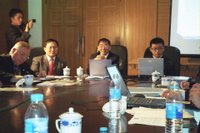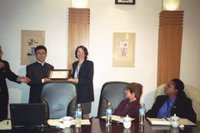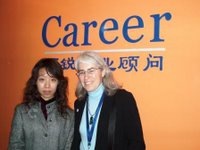
[For Kathy's earlier
career development notes, please see November 28 and November 18]
[photo CBP presentation to career couneling delegation. Credit-- Amy Benedict]Our fourth meeting, examining career development initiatives in China, took place with a professional career consulting company, CBP Career Consultants. Founded in 2000, CBP is a subsidiary of Centry Business Consulting (CBC), headquartered in Canada.
CBP Consultants provides professional career consultation for Fortune 500 companies, and to individuals seeking career and job change. They have offices in Beijing, Shanghai and Guangzhou. CBP Career Consultants is directed by Mr. Bian Binzhang, who has been a human resource chief consultant for NetEase and eBay. Mr. Binzhang received the Asia-Pacific HR Manager Prize.
The firm works with over 30 top professionals including Professor Ma Shibin who is one of the first experts in career management and is a specialist for many Fortune 500 Human Resource Management departments. He was a former Human Resource Manager for Squibb and is the author of
Personnel Career Management.
Mr. Binzahng explained that CBP consultants help individuals to chart the direction of their work life. Because of the growth in private enterprise, many more work opportunities now exist than ever before. Along with this change, Mr. Binzhang stated that career services are badly needed. Their mission is to try to bring professional career development and Human Resource Management to a growing customer base.
CBP endeavors to concentrate in four areas: social research; H.R. development; industry study and career counseling services technology.
Until very recently, employees would look to their families for guidance in their careers. Mr. Binzhang said that getting help from others (like that of a professional consulting firm) could be very difficult to trust. He is not sure as yet if career development philosophy, as applied in the United States, could be adapted by the Chinese people or not.
Yet good paying jobs demand university level training. Currently only 10.5 per cent of Chinese young people, between 18 and 24, can receive higher education, according to statistics from the Ministry of Education (nearly 40 per cent lower than the average level in developed countries.)
Mr. Binzhang went on to discuss a number of problems facing China’s Career consultation field.
Cultural Values:Mr. Binzhang stated that the concept of life/work values has not been a central question to discuss when thinking about employment. The Chinese worker sees work as a means to making a living. Therefore, CBP faces the challenge of not only learning from western career development experience, but also how to implement this knowledge given Chinese traditional work values. What is the value of a life; what is the correct attitude to a career and career counseling. Getting a job and keeping a job has been the goal for the Chinese worker - not expecting to find career satisfaction.
Rights:
The question presented by Mr. Binzhang dealt with the right of all workers to job satisfaction and the right to access career development services in the pursuit thereof.
Trained professionals can and do access career development services via private consulting firms such as Mr. Binzhang. In addition, students, more and more, are introduced to career development strategies via their career resource centers.
But, what about the unskilled, non-professional and those workers who are laid off? Mr. Binzhang wondered how CBP could be of help to these workers that have little education and/or little work experience. This is certainly one of the challenges his firm faces in meeting all the needs of China’s labor market today.
Another issue that Mr. Binzhang referred to is the seeking out of career counseling services itself. Mr. Binzhang stated that the Chinese worker might prefer to go to a “head hunter” firm before they seek out the services of a private career consulting firm. He said that if people seek out a ‘counselor’ they would probably feel more comfortable seeing a mental health counselor than a career counselor when it comes to job/career change, which goes back to the first issue of values – is the Chinese worker familiar with and accepting of the idea of the freedom to choose educational and occupational options, irrespective of loyalty to family and cultural work values.
Nonetheless, Mr. Binzhang stated that the Chinese Government is very open to Career Development services. China traditionally has had a planned economy with lots of restrictions on what kind of job you could have. Today, people can choose their jobs and change frequently. CBP feels that their firm can play a part in helping employees be more competitive while getting the information they need to make the changes they seek.
Even though the Government is open to career development, according to Mr. Binzhang, more is needed towards formalizing standards. There does not exist a professional Career Development Association, as we have in the U.S. (the National Career Development Association) which develops standards for both career counseling and the evaluation of career information materials including guidelines for the provision of career services on the Internet. So the question arises, what is the standard for success in this area in China? Mr. Binzhang noted that it is necessary to build a training program model that (1) entails government certification standards (2) university training of career professionals and (3) leads to licensure.
The Internet, by the way, plays a large role in job development in China today. Check out
http://www.51job.com/, a Web site which connects employees to over 700 employers, particularly foreign companies like: Siemens, Dell, IBM, Mitsubishi Electric, Microsoft, Honeywell, Toyota, 3M, MSN Technologies… 51job.com comes out in tabloid form as well, and reaches millions of people each week.
 Questions and Answers Period:
Questions and Answers Period:The delegates were interested in knowing if CBP had competitors. Mr. Binzhang said 300 maybe as many as 400 career development services have been established recently in one year.
Delegates also wondered how readily do firms utilize career development services. Mr. Binzhang offered a few statistics regarding this matter:
- 47% of management know of career development
- of this group, 70% are interested in career development services
- of this 47%, only 13% would actually like to implement this service in their company today
- over 98% of CBP customers are corporate and in the retail sector
Mr. Binzhang feels that his firm and his competitors must offer quality services that actually make a difference for company employees or the likelihood of employers seeking the services of a professional career development service could dwindle.
We asked Mr. Binzhang what type of professionals work for his company.
He said that they are looking for professionals who have one or more of the following:
- professional background, preferably in H.R.
- psychology background
- career development knowledge
- skillful communicator – able to express themselves
- love the job they are doing and love working with people
What’s interesting to note here, is that one of the professional employees has a degree in Electrical Engineering and decided that this was not the career for her. She made a career shift! She now works as a consultant for CBP because she meets many of the qualifications stated above. She said that she really decided that helping others to fulfill their goals and aspirations is what she really wants to do, regardless of family pressures to do otherwise.
We also asked, how long do the consultants work with a customer. He said the average is 1 week to 2 weeks – the first 1.5 hour consultation session is free.
He also mentioned that a portion of his customers have been overseas for their education and training and know of career services.
Mr. Binzhang stated that the work CBP consultants provide is targeted towards the customer and his or her work values, not soley for the employer.

The session ended with the taking of pictures and sharing of ‘gifts’ and business cards, followed by a brief tour of CBP's Shanghai office.
The staff of CBP was delightful to meet - so friendly, warm and gracious, as all of our hosts in China have been. We wished them good luck in their pioneering endeavors!
[ Dr. Catherine McCormick with one of CBP's consultants ]
Fifth and final session: a visit to a state-run Community Service Center for Employment in Shanghai.





